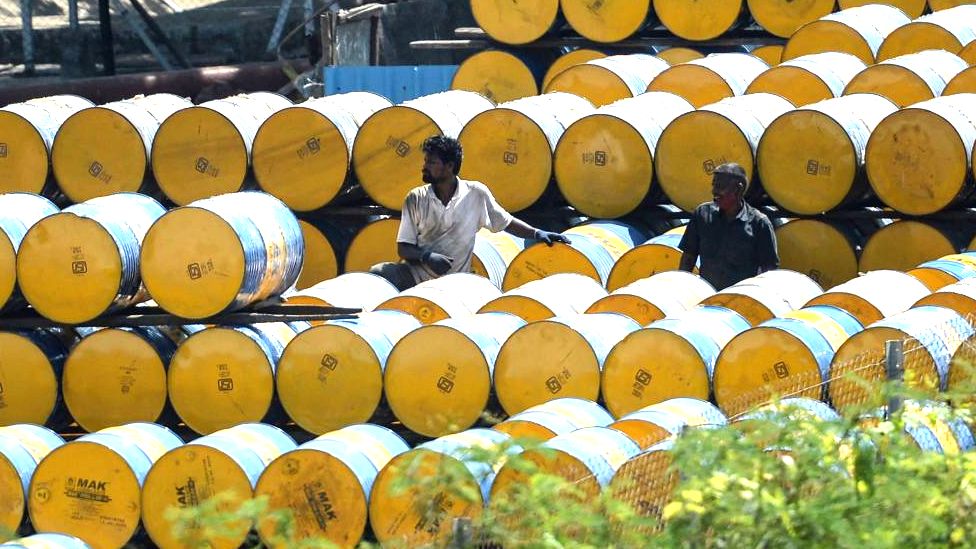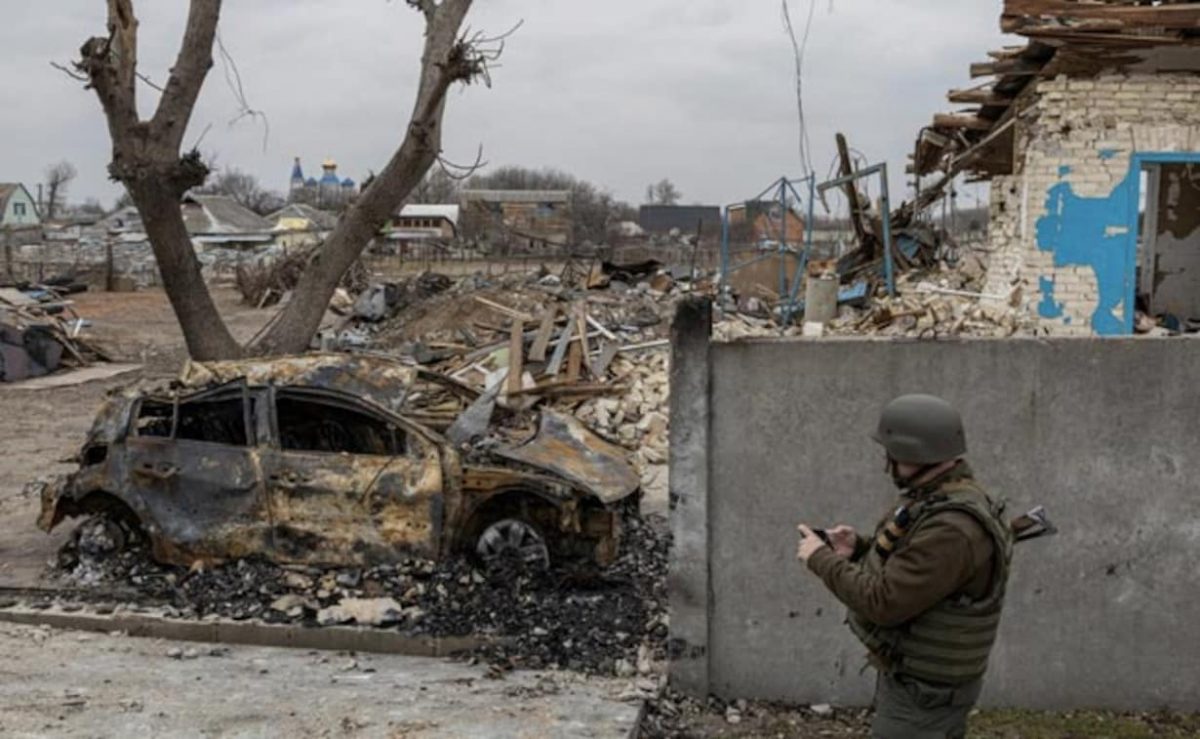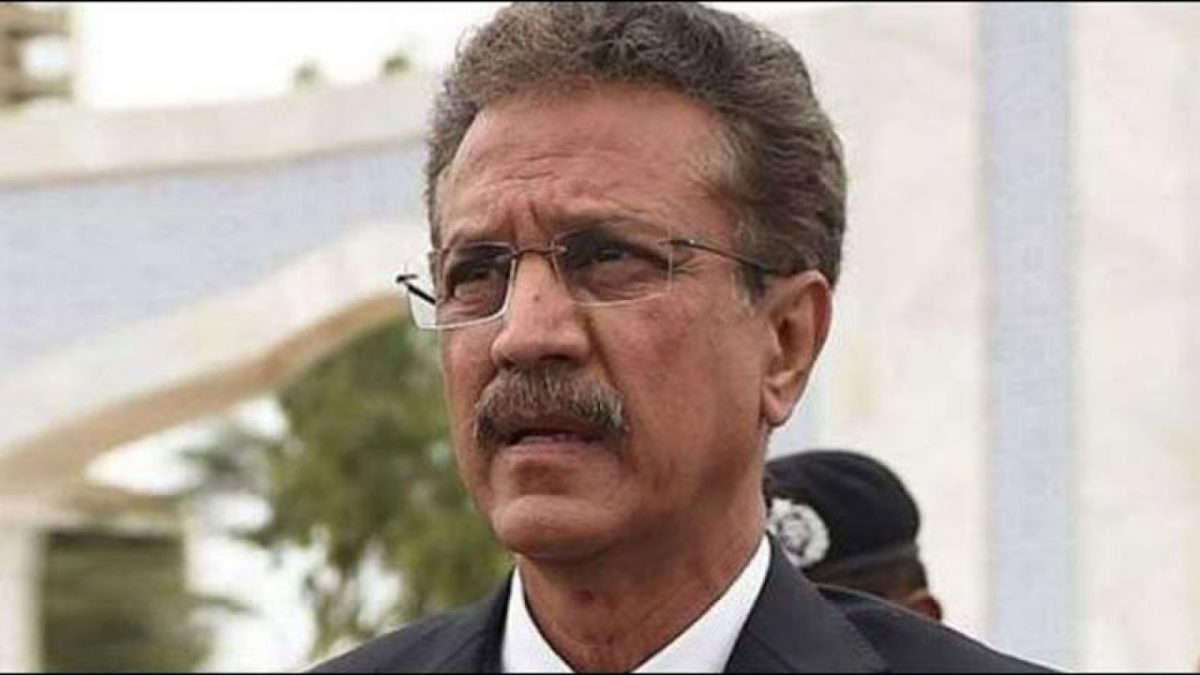KYIV: UN chief Antonio Guterres announced Monday the world body was seeking a humanitarian ceasefire in Ukraine, with its aid chief Martin Griffiths soon to head to Moscow and Kyiv to try to secure a truce.
Ukraine said Monday that at least 5,000 people have died in the “catastrophic” humanitarian crisis gripping pulverized Mariupol, as fighting raged around Kyiv including in a strategic suburb where defenders claim to have driven out Russian invaders.
Multiple cities in Ukraine remained under crushing Russian bombardment on the eve of new face-to-face peace negotiations Tuesday in Turkey, as Kyiv – and its allies in the West – seek to end the month-long war.
In the besieged southern port of Mariupol at least 5,000 people have already been buried, according to a senior Ukrainian official who said as many as 10,000 may have died – appearing to confirm the darkest scenarios of devastation in the city.
“The burials stopped 10 days ago because of continued shelling,” Tetyana Lomakina, a presidential adviser now in charge of humanitarian corridors, told AFP by phone Monday.
Russian attacks near Kyiv cut power to more than 80,000 homes, officials said, underscoring the peril facing the capital despite an apparent retreat in Moscow’s war aims to focus on eastern Ukraine.
“To capture Kyiv is essentially a captured Ukraine, and this is their goal,” warned Ukraine’s deputy defence minister Ganna Malyar, who said Russia was “trying to break through the corridor around Kyiv and block transport routes.”
Fierce Ukrainian resistance however reclaimed the strategically vital Kyiv suburb of Irpin from Russian troops, by sweeping the area block-by-block, according to Ukraine’s Interior Minister Denys Monastyrsky.
AFP journalists said heavy shelling continued to be heard on the road leading to Irpin, however, as residents including 86-year-old Olga Molchanova evacuated from the devastated commuter town.
“I just pray to God for salvation. I pray every day for the soldiers who defend us. Let them have courage,” Molchanova cried after reuniting with her daughter Agnesa Brovkina who described hellish conditions in Irpin.
“My mother was deafened by a rocket. All the time, non-stop, shelling. All day and night, bombing, shelling, all of it,” said Brovkina, a 62-year-old office worker.
Kyiv’s forces also Monday recaptured Mala Rogan, a hamlet on the outskirts of Ukraine’s second-largest city Kharkiv in the northeast.
“There are Russian corpses all over the place,” a Ukrainian soldier told AFP, saying more than two dozen Russian soldiers had been killed in the fight
UN chief Antonio Guterres announced Monday the world body was seeking a humanitarian ceasefire in Ukraine, with its aid chief Martin Griffiths soon to head to Moscow and Kyiv to try to secure a truce.
Ten million Ukrainians have fled their homes since the invasion a month ago, and President Volodymyr Zelensky says as many as 20,000 people may have died nationwide.
Russia stands accused of indiscriminate shelling of civilian areas – something Kyiv and its Western allies have branded a war crime.
On Monday, the country’s prosecutor general, Iryna Venediktova, said there was proof that Russian forces have used banned cluster bombs in the southern Odessa and Kherson areas.
And Britain’s defence ministry separately warned that private Russian military firm Wagner Group has headed to eastern Ukraine, where “they are expected to deploy more than 1,000 mercenaries, including senior leaders of the organisation, to undertake combat operations.”
Humanitarian needs are direst in Mariupol, where Ukraine says about 160,000 civilians remain encircled by Russian forces, desperate for food, water and medicine.
Unburied bodies line streets and residents cowering in basement shelters have been forced to eat snow to stay hydrated, local lawmaker Kateryna Sukhomlynova told AFP.
Ukraine’s foreign ministry called the situation “catastrophic,” saying Russia’s assault from land, sea and air had turned a city once home to 450,000 people “into dust”.
One Russian strike on a theatre-turned-shelter in Mariupol is feared to have killed 300 people.
France, Greece and Turkey are hoping to launch a mass evacuation of civilians out of Mariupol within days, according to French President Emmanuel Macron, who is seeking agreement from Russia’s Vladimir Putin.
Macron warned that any escalation “in words or action” could harm his evacuation efforts, after US President Joe Biden’s shock declaration in Poland that Putin “cannot remain in power”.
Biden has denied calling for regime change, and has refused to walk back his remark, saying it reflected his personal “moral outrage” and not US policy.
He also swatted away concern it would ratchet up tensions with Putin.
“I don’t care what he thinks,” Biden said.
On Monday he unveiled a budget proposal, which requires congressional approval, that would allocate a new $6.9 billion in funding to Ukraine and NATO, and another $1 billion to help counter Moscow’s influence.
Zelensky meanwhile said the first round of in-person talks since March 10 – due to open in Istanbul Tuesday after near-daily video contacts – must bring peace “without delay”.
A Russian demand of Ukrainian “neutrality,” and the future status of Donbas, could be in the negotiation mix.
Russia has de-facto control over the southern peninsula of Crimea that it annexed in 2014, and the self-proclaimed republics of Donetsk and Lugansk in the eastern Donbas region, and Lugansk may hold a referendum on becoming part of Russia.
Kyiv announced a “firm” position ahead of the talks.
“The President of Ukraine gave very clear instructions to our delegation. We do not trade people, land and sovereignty. Our position is concrete,” Foreign Minister Dmytro Kuleba said in a statement.
The new round of talks comes a day after The Wall Street Journal reported that Russian oligarch Roman Abramovich and Ukrainian negotiators were targets of a suspected poison attack – potentially by Moscow hardliners seeking to sabotage the peace talks.
The billionaire businessman, recently slapped with sanctions by Western nations seeking to pressure Putin, has reportedly been shuttling between Kyiv, Moscow and other negotiation sites.
Putin meanwhile has called Moscow’s military goals “demilitarisation and denazification of Ukraine”, as well as the imposition of neutral status.
Facing unexpectedly dogged resistance, coupled with logistical and tactical failures, Russia last week signalled it may be scaling back its campaign, with a “main goal” now controlling Donbas in the east.
But many in Ukraine still suspect Russia could use coming talks as an opportunity to regroup and fix the problems bedevilling its military.
Back in Russia, meanwhile, amid a widening crackdown on dissenting voices, the top independent newspaper Novaya Gazeta, whose chief editor won a Nobel Peace Prize, suspended publication until the end of Moscow’s military action in Ukraine.











